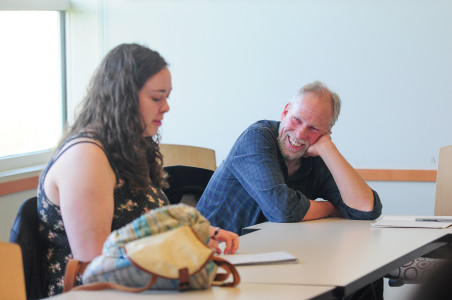
Last Tuesday, NPR Arts Desk Editor and former Grinnellian Tom Cole stepped back on campus for the first time since the early 1970s. Since beginning his radio career at Grinnell’s own KDIC, Cole has moved up through the radio world to develop, edit and produce stories for NPR’s “Morning Edition,” “Weekend Edition” and “All Things Considered,” a position he’s held since 1990. When Cole visited Grinnell this week to lead workshops on pitching stories and the art of storytelling, he took some time to sit down with the S&B’s arts editor Emma Friedlander and talk about the nature of arts coverage, his personal passion for music and why Harold Pinter will ultimately outlast Donald Trump.
The S&B: You’ve been working on NPR’s Arts desk for over two decades and in arts journalism in general for even longer. How has the nature of radio arts journalism changed during that time?
Cole: At NPR specifically, the organization has become much more news-oriented, and so there’s a lot less space for the broader, expansive arts stories that we used to do. When I started, “Morning Edition” had four arts segments every day and we produced all of those. The business has changed, especially with the first Iraq War. I think people turned to NPR for a different look at the news and as a result there became less space for the kind of in-depth arts stories that we used to do. Stories have become shorter as attention spans have theoretically grown shorter in the digital age — I don’t know if that’s necessarily true but that’s the conventional wisdom.
Why do you think it is important to still have journalism on the arts, just as it’s important to have journalism on politics or economics?
People are still reading Shakespeare. Fifty years from now Donald Trump will be a footnote in the same way that Barry Goldwater is a footnote. People will still be going to see plays by Pinter, by Sondheim — all of these things will last. In the moment it’s tough to pick and choose the things that are classics, but you need to cover what’s being created. Art is a response to the world around the creator and oftentimes has quite a bit to say that can’t be said in just straight-up news coverage. That’s why art lasts.
Do you think that arts journalism is an imperative for the arts world?
I think it’s an imperative to the journalism world. It’s imperative that we consider [arts journalism] as news. If David Henry Wong writes a new play, then it’s news. Not just “Hey, there’s a new play, isn’t this great?” but what does it have to say about its subject? Because it can say a lot. When somebody like Springsteen cancels a concert in North Carolina, it’s important because he has and always has had something to say through his music about the world around him. When he cancels a concert, that’s worth paying attention to.
Are there any experiences or lessons from your time at Grinnell that you still refer to in your work today?
Oh, sure. My first radio experience was here at KDIC. I got my third class radio operator’s license specifically so I could work at my college radio station. The other thing is I had a really great German literature in translation teacher. One of the things that I remember him saying is that you need to read aloud in your head — hear the sounds of the words, think about the choices of the words the writer has made and why he or she chose those words. … When I’m working every day I think, ‘Why use that word instead of this word?’ Because words are important.
Was your personal study of musical performance inspired by your work in arts reporting, or did your interest in performing and music come first?
Reporting grew out of the interest that I had. [Growing up], my friends and I would just sit around a room listening to records and saying, “You’ve got to check this out, listen to this.” That interest in music and in sharing it, and turning people on to different kinds of stuff, I guess that’s what led to where I am.
Is there a genre you weren’t very familiar with or interested in that your work at NPR exposed you to and you ended up developing an interest for?
One of the great things about the job is that there are different stories everyday. I wasn’t really into dance at all, but through working at NPR I got to actually see Merce Cunningham perform, Martha Clark, some very cool stuff that I knew nothing about.
What’s the difference between an interview subject that makes for an interesting story and one that falls flat?
It’s an interesting question because I can think of a specific example. I’ve interviewed and done three stories on the photographer Robert Frank. He’s very intense, quiet and even though he’s lived in the United States since before the Second World War, he still has a thick Swiss accent. You can’t go in there and not know what you’re talking about. It’s the kind of story that you have to interview other people for, you have to be able to draw him out and get him to talk about specific situations that he’s photographed. Sometimes dumb questions work — it’s just how you profess it. Like, “I’m sorry, I know this is a really stupid question, but I’m just dying to know what your favorite breakfast food is.” Actually, you probably wouldn’t want to ask that.

















































